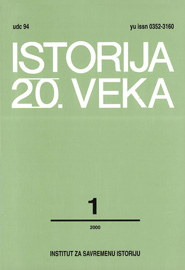KRALJEVINA SRBA, HRVATA I SLOVENACA I PITANJA OPTANATA NA KONFERENCIJI MIRA U PARIZU 1919-1920
THE KINGDOM OF THE SERBS, CROATS, AND SLOVENES AND THE QUESTION OF THE MINORITIES OPTION AT THE PARIS PEACE CONFERENCE 1919-1920
Author(s): Gojko MalovićSubject(s): Diplomatic history, Recent History (1900 till today), Pre-WW I & WW I (1900 -1919), Interwar Period (1920 - 1939), Politics and Identity
Published by: Institut za savremenu istoriju, Beograd
Keywords: Kingdom of Yugoslavia; minorities; Paris peace conference; nationality;
Summary/Abstract: The question of the minorities' option has previously drawn little attention in Yugoslav historiography and social sciences. This question, which appeared in Serbia and Montenegro already in the 19th century, then primarily regarding Muslims, still remains to be studied. The Paris Peace Conference (1919-1920) lent particular attention, unprecedented in European history, to the protection of minority rights. This problem included the option for members of minorities to choose their nationality. Every peace agreement signed at the Conference in Paris contained articles stipulating this option for those belonging to ethnic, racial, language, or religious minorities. The peace agreements signed at Versailles already determined the right of minorities to this option. At the time this right did not pertain to minorities in the Kingdom of the Serbs, Croats, and Slovenes, but these agreements served as a model for the essential elements of this option in all the peace agreements subsequently signed with Austria, Bulgaria, Hungary, and Turkey. The option offered the possibility for members of minorities to freely choose, within a set period of time, their nationality and to transfer their domicile to the country where the nationality of their choice presented the majority. The decision to acknowledge the right of persons to the chosen nationality depended in some countries with which a peace agreement was signed on rights based on origin, and in others on rights based on domicile. The time limit for making the choice of nationality varied in peace agreements, going from six months to two years, while the term for transferring domicile to the country of choice varied between six and twelve months. Despite their efforts, the representatives of the Kingdom of the Serbs, Croats, and Slovenes, and particularly the delegation representing the Kingdom at the Conference in Paris, had little influence on the final formulation of the articles regarding this option in the peace agreements and the agreement on the protection of minority rights signed at the time. The option pertaining to the Kingdom of the Serbs, Croats, and Slovenes was entered in the Convent on Minorities and the peace agreements signed with Austria (in Saint-Germain-en-Laye, on 10 September, 1919), Bulgaria (in Neuilly-sur-Seine, on 27 November, 1919), and Hungary (in Trianon, on 4 June, 1920), but did not form part of the peace agreement signed with Turkey (in Sevres, on 10 August, 1920). The implementation of'these minority rights guaranteed by the peace agreements signed at the Paris Peace Conference proved to be of crucial importance to the members of Yugoslav, and especially Serbian, minority groups in neighboring countries.
Journal: Istorija 20. veka
- Issue Year: 2000
- Issue No: 1
- Page Range: 29-48
- Page Count: 20
- Language: Serbian

